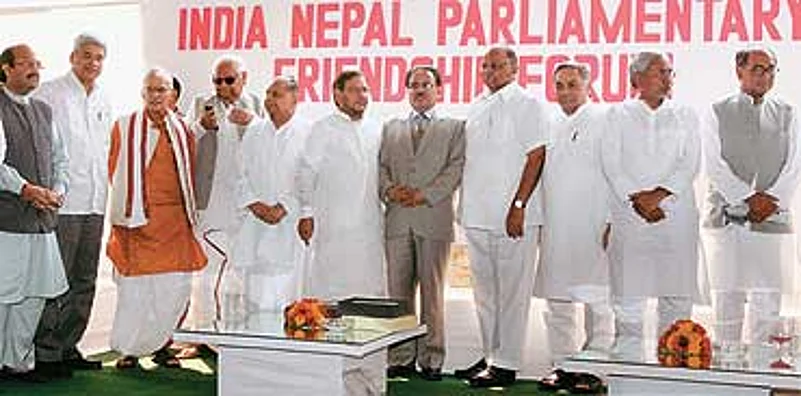
No disarray: Prachanda meets Indian leaders across the political spectrum, in Delhi
He was coming from a Kathmandu clamouring for "equal" treatment from India, and cries to tell "Big Brother" to get real. Doubts and suspicion, conspiracy theories and needless India-bashing formed the backdrop to his first official visit. Prachanda himself has encouraged some of the din using words such as "unfair" and "unequal" for the various pacts with India. Days before arriving in New Delhi, he said he wanted Nepal to be "neutral" between India and China. Having detected the anti-India sentiment, it is no surprise that China has chosen three words—trust, equality and sincerity—as the basis of its Nepal policy.
Much has been made of the fact that Prachanda visited China before he came to India but he has more than explained the special circumstances and compulsions that made him attend the Olympic closing ceremonies. Actually, Colombo would have been his first foreign stop for the saarc summit but the intrigues of Kathmandu postponed his election and sent an ailing acting prime minister G.P. Koirala in his place, he told an old friend in Delhi. While New Delhi noted the Beijing trip, officials say, India will not let it ruffle its feathers.
Indian officials were in a listening mode, learning about the priorities of the new government. They will wait to assess Prachanda's effectiveness in delivering his promise to ensure a safe and secure environment for business and engaging on the broad range of issues that affect both sides. Indo-Nepal relations are unique because the two countries are deeply enmeshed in religious, cultural, social and economic ties. Millions of Nepalese live and work in India, enjoying most benefits available to Indian citizens. India was involved in Nepal's recent political transformation, recognising, albeit slowly, the profound nature of the change. Winning the new Nepal as a real friend requires looking at the small landlocked country of 2.5 crore differently and shedding the old ways of playing one interest group against another. Sandwiched between a galloping China and emergent India, Nepal too must prosper, Prachanda said.
India is ready to hold Nepal's hand, and reinvigorate the relationship. It is also ready to revamp the Friendship Treaty, which so far has worked in Nepal's favour because India has not insisted on reciprocal benefits. Article 6 and 7 of the treaty stress "national treatment" with regard to residence, ownership of property and movement of the people but it is the Nepalese who have enjoyed the privileges. India, mindful of its size and capacities, has resisted demanding the same. It has also been accommodating on the question of Nepal buying arms from the west and China despite Article 5, which says Nepal should purchase from Delhi. An exchange of letters in 1965 made the provision stronger, "committing" India to supply all needs of the Nepali army. But the article is understandably a source of discomfort for the small neighbour. Sources say the Maoists may be looking for "cosmetic changes" in the treaty to satisfy demands at home without making substantial changes. "Our general approach is to build upon what we have," says Shiv Shankar Menon, India's foreign secretary.
India's involvement in Nepal ranges from the very big to the very small, from building hydro power projects to holding eye camps, from building highways to small polytechnics. India accounts for 55 per cent of Nepal's exports and the ongoing economic and development assistance to Nepal stands at Rs 15 billion. Pension disbursements for ex-servicemen amount to around Rs 500 crore annually and 2,000 Nepali students receive scholarships here. India gave Rs 1 billion in direct budgetary support to Nepal in 2006, and supported the political transition generously, including sending electronic voting machines. As of October 2007, there were 265 approved projects in Nepal.
Prime Minister Manmohan Singh this week announced a Rs 20-crore relief package for flood victims in Nepal besides emergency relief of sugar, wheat, rice and petroleum products. India will also rebuild segments of the East-West Highway damaged in the recent Kosi floods. Menon said meetings at the level of home, water and commerce secretaries would be held "very soon" to give fresh impetus to bilateral ties. A high-level delegation is expected to visit Kathmandu during September 28-30 to discuss hydel projects, including building a high dam on the Kosi river in Nepal to control floods and generate power. And it appears the local politics of Bihar will not be allowed to interfere in Indo-Nepal relations.
Both Bihar chief minister Nitish Kumar and Union railway minister Laloo Prasad Yadav have been trying to show "they care" more than the other about the flood victims by seeking a role in bilateral talks. But the MEA refused them "cheap political points". Laloo wanted to visit Kathmandu before Prachanda's visit to Delhi but was told by foreign minister Pranab Mukherjee to stay put, sources said. Nitish Kumar met Prachanda at JD(U) leader Sharad Yadav's lunch, having been shut out of the official meetings.
India's domestic politics aside, there is a need for the Centre to give sustained quality attention to Nepal to solve both the real and perceived problems of status and embrace the new leadership. But the hug must not smother Nepal.





















